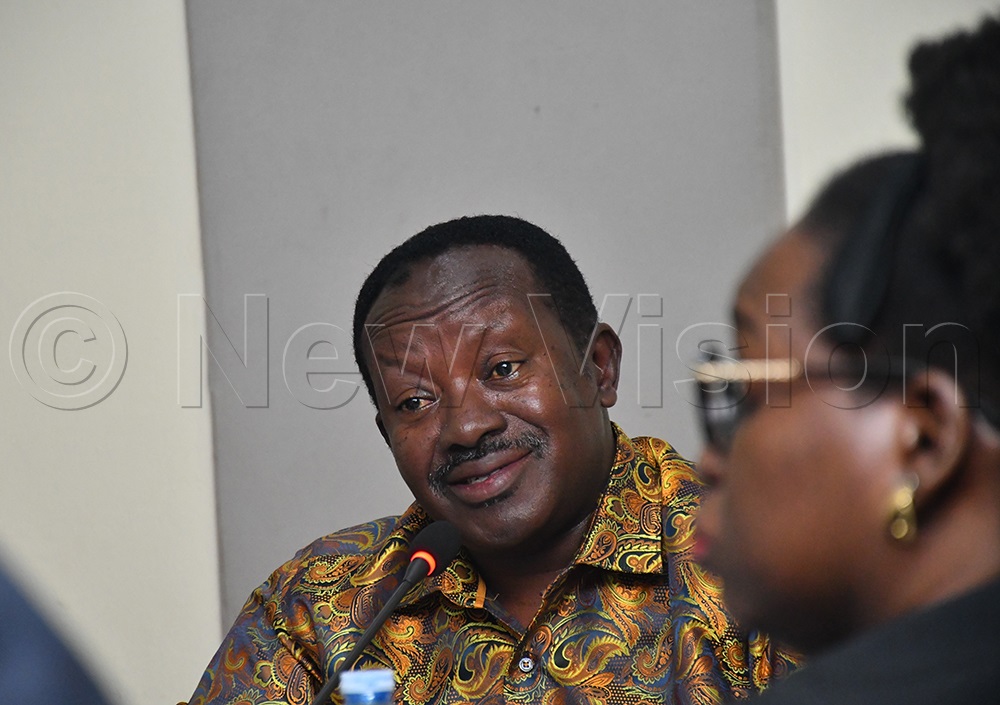News
Public Prosecutors warn forensic bill could stall prosecution
The Bill, re-tabled by Maj. Gen. (Rtd) Kahinda Otafiire, seeks to regulate forensic and scientific analytical services by ringfencing GAL as the national referral centre for forensic and analytical services among others.
State minister for Internal Affairs David Mhoozi, leading his team to present proposals in the Forensic Bill before parliament's defence committee, next to him is Lt Gen. Joseph Musanyufu, the Permanent Secretary. (PHOTO BY EDITH NAMAYANJA)
By: Dedan Kimathi, Journalists @New Vision
_________________
Officials from the Office of the Director of Public Prosecutions (ODPP) have opposed the Forensic and Scientific Analytical Services Bill, 2025.
They voiced their concerns on Wednesday, September 24, 2025. This was during a meeting with the Defence and Internal Affairs Committee, chaired by Nyabushozi County MP Wilson Kajwengye (NRM).
State minister for internal affairs Gen. David Muhoozi, Permanent Secretary (PS) Lt Gen. Joseph Musanyufu and Kepher Kuchana Kateu, the Director of Government Analytical Laboratory (GAL), also attended the meeting.
The Bill
The Bill, re-tabled by Maj. Gen. (Rtd) Kahinda Otafiire, seeks to regulate forensic and scientific analytical services by ringfencing GAL as the national referral centre for forensic and analytical services among others.
It should be noted that the Bill was first introduced to Parliament on November 26, 2024, but was later withdrawn in February this year over sticking issues that Muhoozi said needed alignment.
Ambiguity
However, while appearing before MPs, John Baptist Asiimwe, the Deputy Director of Public Prosecutions, cautioned that ringfencing the Government Analytical Laboratory (GAL) as an appellate body would likely spark legal contestations and slow down prosecutions.
“A referral is like you have a problem you want to solve, but for some reason you are unable and refer it. When it comes to forensics, we shall have challenges with litigants always asking for referrals. Because we have different laboratories that do examinations, produce reports that we use in our ordinary courts,” said Asiimwe.
“If we make GAL as a referral, it is like having an appellate system where everybody wants to go up to the Supreme Court, which is not applicable when it comes to science. Now, we shall have different reports contradicting reports in court,” he explained.
Adding that if the function of GAL is complementary, the bill should be plain and clear. The same was cited by Assistant DPP Barbra Kawuma Bugembe.
“Imagine DNA samples are picked at a murder scene and taken to a laboratory, let’s say Police. A report is produced implicating the suspect. I can assure you, defence lawyers are going to say, we are not satisfied with this report, we want a national referral for them to come up with another report,” Kawuma argued.
Police lab oversight
He also pointed out that in its current form, the Department of Government Analytical Laboratory (GAL) would regulate all laboratories engaged in forensic analysis and related services, including those of the Police, effectively undermining the reporting mechanisms established under Article 120 (3).
The aforementioned provision tasks DPP to direct the Police to investigate any information of a criminal nature and institute criminal proceedings against any person or authority in court other than a court martial.
“If you read it plainly, you are regulating the Police and investigations. No, it's not proper,” Asiimwe disagreed.
DGAL speaks out
However, Kepher Kateu disagreed with some concerns, saying the law aims to standardise and decentralise forensic services in Uganda, a move from which the ODPP stands to benefit.
“I really commend submissions from DPP, but with a pinch of salt. Because they are the heavy consumers of the outcome, and if they are shooting themselves, tomorrow they are going to have it rough with the Defence counsels. Because it has already happened,” Kuchana warned.
Adding that ninety percent of the work they are handling is related to provision of evidence on court. With many of these cases referred to them by the Police. Something that wouldn’t be happening if the latter had capacity.
According to Kuchana, there is a big difference between a medical lab and theirs.
“Medical laboratories do diagnostic testing and come up with test results, which they present whether there is the presence or absence of a certain ailment. Forensic laboratories provide results through analytical methods. We examine physical objects using rigorous scientific methods, and thereafter, we provide a report of our findings. From the findings, we provide a narrative of the trend and conclusions,” he elaborated.
“I had the submission of the DPP that in the village, a nurse or similar officer can examine a victim. But does that examination provide conclusive evidence? For us, in cases such as DNA analysis, we collect multiple samples—saliva, vaginal swabs to detect semen, blood, urine, and stomach contents. All these samples are taken from the crime scene and submitted for analysis,” he cited.
Way forward
Fast forward, Gen. David Muhoozi requested time to consult the Government’s legal adviser and other stakeholders before taking further action.
“What I pick from this is that we need consensus and another in-house discussion. But this time, with the Attorney General (Kiryowa Kiwanuka) in the House…” Muhoozi observed.
“But the ministry position is that there is a policy vacuum and this needs legislation,” he concluded.
MPs weigh in
Lwemiyaga County MP Theodore Ssekikubo said, “I don’t know how the ministry intends to resurrect and put life in this bill. But to me it appears you have laid it bare; the areas of concern are so fundamental to the bill…”
Adding that “In its current form, I don’t see how the bill can even earn its time on the floor of parliament. The Minister being a good friend of the committee and the PS, we shouldn’t look ugly on the floor of parliament when his own committee rejects the bill.”